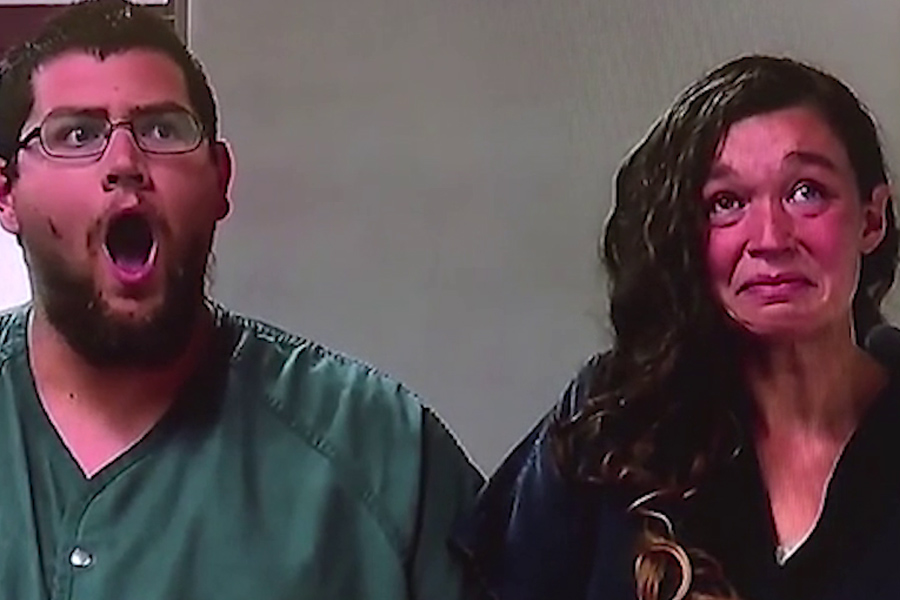Basic Information
| Field | Detail |
|---|---|
| Full name | Tatiana Elena Fusari |
| Date of birth | November 10, 1990 |
| Residence (at time of case) | Kent County, Michigan |
| Known for | Criminal case involving the August 2018 death of her infant daughter, Mary Welch |
| Convictions | Felony murder; first-degree child abuse |
| Sentence | Life imprisonment for the murder conviction; additional prison term for child abuse |
| Appellate status | Convictions affirmed on appeal in March 2023 |
| Family | Spouse: Seth Welch; Daughter: Mary Anne “Mary” Welch (deceased) |
Family and Personal Relationships
Tatiana Fusari’s public identity is inseparable from the brief life and tragic death of her infant daughter, Mary Anne Welch, and from her marriage to Seth Welch. Mary was born in October 2017 and died on August 2, 2018, at ten months old. In the months that followed, police, prosecutors, and medical experts focused on the infant’s severe malnourishment and dehydration. The findings set the legal trajectory that would define the rest of Fusari’s adult life.
Fusari and Welch were co-defendants. Public documents and courtroom testimony described a household where medical care was distrusted and where parents claimed religious motivations in their approach to child-rearing and health. While coverage often focused on Seth’s public statements, both parents’ choices were placed under the microscope in court. The couple’s other young children, who lived in the home at the time, were placed into protective care after Mary’s death.
The Case: From Investigation to Trial
On August 2, 2018, emergency responders were called to the family’s home. The ten-month-old Mary was unresponsive. An autopsy concluded she died of malnutrition and dehydration—a clinical summary that later became a central refrain in charging documents and at trial.
Prosecutors charged Tatiana Fusari and Seth Welch with felony murder and first-degree child abuse. In Michigan, felony murder is treated as first-degree murder; a conviction carries a mandatory life sentence. The predicate felony identified by prosecutors was child abuse, and the state’s theory was that a combination of neglect and denial of medical care led to Mary’s death. Evidence presented at trial included testimony about Mary’s weight, feeding patterns, and the parents’ resistance to conventional medical interventions. Defense arguments, in contrast, attempted to contextualize the parents’ beliefs and decisions, while questioning elements of causation and intent.
The courtroom became a stage where competing narratives about parenting, faith, and responsibility played out, but the jury’s verdict ultimately tracked the medical and chronological findings. Fusari was convicted of felony murder and first-degree child abuse. Her husband, tried separately, was also convicted and sentenced to life without parole. The image left behind was stark: a child’s life counted in ounces and days, and the law responding with its most severe penalties.
Sentencing and Incarceration
Following the jury’s verdict, the court imposed the mandatory life sentence for the felony murder conviction. The first-degree child-abuse conviction added an additional prison term. In practical terms, the life sentence controls. Michigan’s framework for first-degree murder leaves no parole opportunity in such circumstances, and official records list her as incarcerated with life as the earliest release.
The sentence mirrors the gravity of the findings: a preventable death, severe malnutrition, and a determination of culpability rooted in both action and omission. In sentencing remarks common to cases like this, judges frequently reference deterrence and moral condemnation. The arc of punishment, in this case, was unambiguous and immediate.
Appeals and Legal Aftermath
Fusari appealed her convictions, arguing issues common to serious felonies: sufficiency of the evidence; trial rulings; and how the jury was instructed on the law. In March 2023, the Michigan Court of Appeals affirmed the convictions. Appellate courts rarely relitigate facts; instead, they examine whether the trial was conducted within the boundaries of law and whether the evidence could reasonably support the verdict. The appellate judgment left the trial outcome intact.
Post-appeal options in such cases are narrow: applications to the state supreme court, potential federal habeas proceedings, or other extraordinary relief. None of these pathways change the immediate reality that the underlying convictions and life sentence stand.
Media Coverage and Public Perception
The case drew wide attention across Michigan and nationally. Mary’s age, the stark medical findings, and the parents’ expressions of religious skepticism toward doctors became combustible ingredients for headlines and nightly news segments. Video clips from interrogation rooms and the courtroom circulated online, where true-crime communities replayed testimony and debated motive, belief, and blame.
Public reaction fell along familiar lines. Some saw the case as a failure of parental duty and a chilling example of belief overriding basic care. Others framed it as a tragedy born of insular ideology and fear of institutions, with the heaviest price paid by a child. Whatever the lens, Mary’s short life and the criminal outcome etched an outline that was hard to look away from.
Key Timeline
| Date | Event |
|---|---|
| October 2017 | Birth of Mary Anne “Mary” Welch |
| August 2, 2018 | Mary found unresponsive; later declared deceased |
| August 2018 | Parents charged with felony murder and first-degree child abuse |
| 2019–2020 | Pretrial proceedings and motion practice |
| Early 2020s | Jury trials and convictions of both parents |
| Sentencing (post-verdict) | Life imprisonment imposed for felony murder; additional term for child abuse |
| March 2023 | Michigan Court of Appeals affirms Fusari’s convictions |
| 2025 | Fusari remains incarcerated in the Michigan Department of Corrections |
Legal Context: What the Convictions Mean
Felony murder in Michigan is classified as first-degree murder and triggers a mandatory life sentence. First-degree child abuse is itself a gravely serious felony and can carry decades of additional incarceration. When both counts are sustained, the practical effect is that the murder sentence overshadows everything else. Appeals focus on whether the trial was fair and legally sound, not on reweighing the evidence from scratch. In Fusari’s case, the appellate decision maintained the original verdicts and sentences.
Portrait of a Family Under Scrutiny
The case’s human core is a family: a baby who lived ten months, two parents thrust into the glare of criminal court, and other children sent into protective custody. Court testimony painted a picture of beliefs and choices that, according to jurors, crossed a legal line with fatal consequences. The narrative is not one of a single moment, but a long slope—day by day, ounce by ounce—until medical realities collided with the law. The aftermath is measured in years and life terms, a grim exchange for a life measured in months.
FAQ
Who is Tatiana Fusari?
She is a Michigan woman convicted in connection with the August 2018 death of her ten-month-old daughter, Mary Welch. She received a life sentence for felony murder, plus an additional term for first-degree child abuse.
What happened to Mary Welch?
Mary died at ten months old; medical findings determined malnutrition and dehydration as the cause of death. Her parents were subsequently charged and convicted.
What crimes was Tatiana Fusari convicted of?
She was convicted of felony murder and first-degree child abuse. The murder conviction carries a mandatory life sentence in Michigan.
Where is Tatiana Fusari now?
She is incarcerated in the Michigan Department of Corrections. Her earliest release is listed as life.
Who is Seth Welch?
He is Fusari’s husband and co-defendant. He was tried separately, convicted, and sentenced to life in prison.
Did the appeals court change the outcome?
No. In March 2023, the Michigan Court of Appeals affirmed Fusari’s convictions and sentences.
Were there other children in the home?
Yes. Other young children lived in the home and were later placed in protective care.
Was religion a factor in the case?
Courtroom testimony and public reporting described parental distrust of medical care linked to religious beliefs. The jury nonetheless found criminal liability based on the evidence.
How old is Tatiana Fusari?
She was born on November 10, 1990. As of 2025, she is 34 years old.
What is her sentence length?
She received life imprisonment for the felony murder conviction, plus an additional prison term for child abuse. In practice, the life sentence governs.



